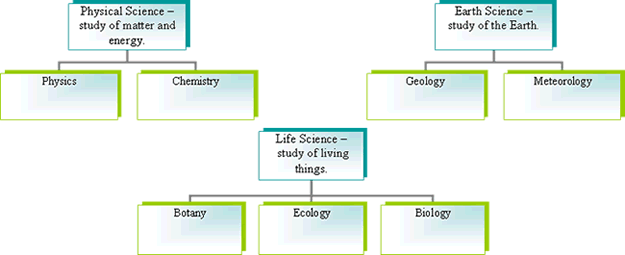 username@email.com
username@email.com
In this lesson we review the discipline of science and the process of scientific investigation.
Science is a system of knowledge based on facts or principles. This knowledge is generally accrued using the scientific method which involves scientific investigation. Only in the past 100 years of the few thousand that man has inhabited the earth, has science been taken seriously. Science was considered a mad man’s folly in medieval times. It was also called sorcery and magic by others. There are even recorded cases of executions because of persons practicing science. All that has changed through the passage of time and the persistence of dedicated scientists. Over the years, science has become the accepted and rational explanation of many phenomena of our world. This acceptance came from the repeated conclusions drawn by scientists that were made through inquiry and scientific investigation.
Scientific investigation occurs in all branches of science. While all parts of science are interconnected, the two main branches of science are social and natural. Natural science investigates nature. Natural sciences are physical, earth and life sciences. Below are examples of each type of natural science.

Who, what, when, where, and how have been questions of scientists, journalists, teachers, and five year olds for as long as any of us can remember. How these questions are answered is sometimes more important than the actual answers themselves. All questions are answered through a process called scientific investigation. Our lives are built upon scientific investigation and inquiry. From the materials used to build our homes, to the foods that we eat, scientific investigation controls the lifestyle that we live today.
Scientific investigation is a systematic formula for acquiring new knowledge and furthering previous knowledge. It is based on observable and measurable evidence that is subject to rules. Many science textbooks have different steps involved in scientific investigation. Some procedures have up to sixteen steps. However, lets just look at the basic steps: observation, hypothesis, experimentation and conclusion. Each of these facets is an important aspect of the investigation.
The first principle of scientific investigation is observation. Observation is the gathering of information utilizing a variety of methods. The general process of observing is completed using the five senses: sight, smell, touch, taste and hearing. After gathering information, descriptions of the topic/problem are formed. Descriptions should be accurate and reliable.
After the steps of the investigating process have been accomplished, the scientist will formulate a testable hypothesis. A hypothesis is an educated guess written in an if/then format. For example, if I wake up late every day for school, then I will often be tardy to first period. The formulation of a hypothesis is based upon observations and descriptions and should be able to be tested through experimentation. The hypothesis should also contain a control group to ensure a fair sampling of possible occurrences. After the development of a hypothesis, it must be tested.
Experimentation can be completed in a number of ways: counting information, performing titrations, or using gas chromatography, just to name a few. Once the hypothesis has been tested and data has been accumulated, the information must be interpreted. This is called a conclusion.
The purpose of scientific investigation is the summarizing of data and learned information. The experimentation results will prove or disprove the hypothesis. This leads to new questions and further investigations. This also allows scientific theory to possibly become scientific law. Scientific investigation allows for the distinctions of prediction, theory and scientific law to be clear. Prediction is a hypothesis; theory is a proven hypothesis, while scientific law is a continually reproducible result to an experiment.
Scientific investigation has been responsible for the ease of living in our modern world. Science has developed syringes for medication, airplanes for traveling, and instant communication to learn of world occurrences. With the further acquisition of knowledge come further advancements in all components of our lives. Without scientific investigation, our buildings would crumble around us. The search for knowledge through investigation gives us proven tomorrows. Now what tomorrow holds, only further inquiry will tell us.